


CEO and President of FORUM8
FORUM8 Shade3D Development Group, Deputy Manager
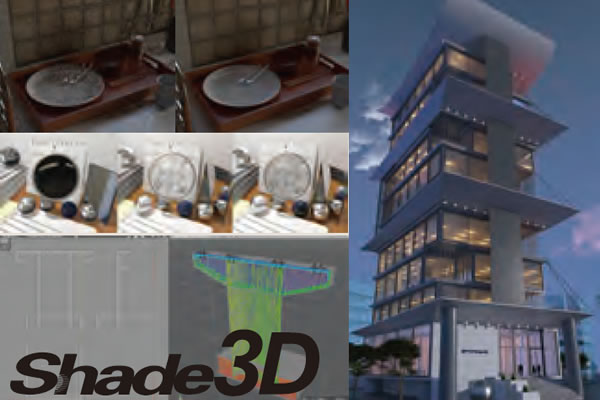
Lecture
Overview of Shade3D
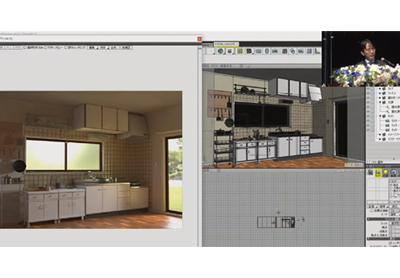
The lecturer operated Shade3D and explained the new features.

The new features of Suite Chidori Engine and the sample games were introduced.
After mentioning the overview of Shade3D, an integrated 3DCG software, he explained the new features of the current Ver.22 with demonstrations, including rendering (GPU ray tracing, AI denoiser), drawing (drawing display mode, Hidden line display mode, saving and printing drawing images), modeling (Swept Surface, Closing Free-form Surface), file input/output (Enhanced DXF Import Function, support for Import of FBX2020). He also mentioned the new features of “Shade3D BIM/CIM Design Check Tool Ver.22”, such as IFC import, IFC export, IFC Attribute Information Display, IFC Attribute Information Editing, BIM/CIM Design Check Tool, and the addition of sample educational materials for “Shade3D Block UI Programming Tool Ver.22”. In addition, he developed his presentation into the publication of "Shade3D Official Guidebook 2022 for Beginners" and future development plans for each product. At the same time, he introduced the characteristics and new features of "Suite CHIDORI Engine," a domestic cross-platform 3D engine that allows utilizing Shade3D data.


Judges (from the left): Assoc. Prof. Tomohiro Fukuda, Prof. Makoto Sato, Prof. Taro Narahara, Mr. Pencreach Yoann

Awards Ceremony

Award Winners
The final open judging of the 9th Cloud Programming World Cup (CPWC) for students was held in the second half of the morning of Day 2. The results announcement and the awards ceremony were held in the second half of the afternoon with Patrick Harlan also joining there as a presenter. CPWC is a competition for cloud application programming technology using Software Development Kits. From April 2 to June 30, many entries were entered from across Japan and abroad, mainly from Asia. From among the works submitted (from September 25 to October 2) by the teams that passed the 1st round selection meeting (July 6), 8 works were nominated (October 15) after nomination selection (from October 8 to 14). In the second half of the morning of Day2 (November 18), each team gave a one-minute presentation, based on which the final open judging was conducted by 4 members: Judging Committee Chief, Tomohiro Fukuda, Associate professor at Graduate School of Engineering, Osaka University; and juries including Makoto Sato, Professor Emeritus of Tokyo Institute of Technology; Taro Narahara, Associate Professor, College of Architectural Design, New Jersey Institute of Technology; and Yoann Pencreach, Senior Manager of Development Group, FORUM8.
As a result, World Cup Award was given to "Driver Emotion and Abnormal Behavior Detection and Warning System" by SC-Team from Shanghai University (China). It detects drivers’ emotions and abnormal behaviors while driving and feedback the results to the mobile web terminals and UC-win/Road in real time. The plug-in works to show warning messages properly or ease the driver’s mood to keep the driver in good driving condition. Controlling emotions is very important for drivers. Prof. Fukuda evaluated this work that it took a comprehensive approach, such as deep learning and reading facial expressions using a camera, and that the system was perfectly developed.
Honorable Judge Award Environment Design and IT Award (Prof. Fukuda) went to "Design of Interactive Simulation System for Autopilot Vehicle and Pedestrian" by TRANSer from Beihang University (China). Honorable Judge Award Best Optimization Award (Prof. Sato) went to " Study on the characteristic laws of urban road traffic flow under rainstorm and waterlogging" by SMTH_2021 from Tsinghua University (China). Honorable Judge Award Excellence in Creativity Award (Prof. Narahara) went to "DeepPAVE: Deep learning-based Personalized Autonomous VehiclE" by HAVI from Kookmin University (Korea). Honorable Judge Award Innovation Award (Mr. Pencreach) went to "Fatigue Driving Assistance Monitoring System" by Highways from Shanghai University.
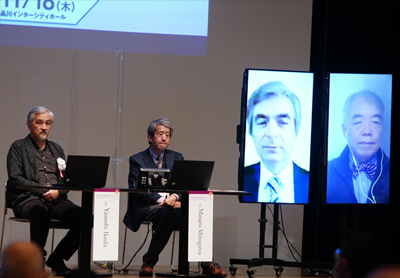
Judges (from the left): Prof. Yasushi Ikeda, Prof. Masaru Minagawa, Prof. Kostas Terzidis, Prof. David Tseng

Awards Ceremony

Award winners
Following CPWC, the final open judging of the 11th Student BIM & VR Design Contest on Cloud (VDWC) was held in the second half of the morning of Day 2, and the results announcement and awards ceremony were held in the second half of the afternoon. VDWC is a competition for advanced architectural and civil engineering designs in the cloud, and this time it has set "Phuket Smart Resort Design Challenge!" as its theme. Like CPWC, many entries were entered from across Japan and abroad from April 2 to June 30. From among the works submitted (from September 25 to October 2) by the teams that passed the 1st round selection meeting (July 6), 7 works were nominated on October 15 after nomination selection (from October 8 to 14). In the second half of the morning of Day2, each team gave a one-minute presentation, and with the cooperation of Asst. Prof. Walaiporn Nakapan, Local Advisor and Founder of Parabolab, Bangkok, the final open judging was conducted by 4 members: Prof. Yasushi Ikeda, Judging Committee Chief and Professor, Graduate School of Media and Governance, Keio University; Prof. Kostas Terzidis, Jury and Professor, Tongji University (China); Prof. Masaru Minagawa, Professor Emeritus, Tokyo City University, and Prof. David Tseng, Professor, National Chiao Tung University (Taiwan).
As a result, "Bubble Stream" by Burbur Chacha from National University of Kaohsiung (Taiwan)won World Cup Award. By analyzing various existing issues in Phuket, combining life with AI technology and innovative bubble system, it aims to make Phuket a beach resort city with a sense of future generations. Among other excellent works, the idea of ensuring the sense of safety of tourists with "Bubble Stream" in expectation of the needs that will rise after COVID-19 crisis attracted attention. Prof. Ikeda evaluated that the attitude of thinking positively rather than taking this new situation negatively was favorable.
Excellence Awards went to two works. One is "NEVERLAND" by NERVLAND from National University of Kaohsiung (Taiwan). Neverland is constructed of an information system based on the concept of neural networks. To get more efficient and abundant travel experiences, the system will arrange smart robots with every tourist following their preferences and present a personalized visual experience by reading the information in their brain. The other is “Pearl Smart Resort” by Greenhorns from Technological University (hmawbi) (Myanmar). It proposes healthy and sustainable resorts with focus on environmental resources such as zero emissions, recycling, and nature preserve.
Honorable Judge Award Architectural Informatics Award (Prof. Ikeda) was given to "ARK No. 33" by Little Mermaid from National University of Kaohsiung (Taiwan). Honorable Judge Award Recycling Award (Prof. Minagawa) was given to "The ECO-SMART Resort" by Wave Blade from University of Transport and Communications (Vietnam). Honorable Judge Award Anadrome Award (Prof. Terzidis) went to "An enchanting evergreen wonderland" by NEWEST from University of Transport and Communications (Vietnam). Honorable Judge Award EcoVision Award (Prof. Tseng) went to "Energy Circulation City" by U crew from Nihon University (Japan).
Manager of Omiya Ardija VENTUS / Vice President of Jumonji University / Guest Professor of Biwako Seikei Sport College / Former Manager of Japan Women's Football Team / Former Director of Association for Resilience Japan

Lecture
Profile

Lecture by Mr. Norio Sasaki

Talk session by Mr. Norio Sasaki and Yuji Ito, President and CEO of FORUM8
The first half of the afternoon of Day 2 started as a “Special Session” with Mr. Norio Sasaki, General Director of Omiya Ardija VENTUS / Vice President of Jumonji University (titles at the time of the lecture) presenting a special lecture entitled "Process to Achieve Goals – Teamwork and Communication-". First of all, he showed the video of 2011 FIFA Women’s World Cup with the scene when Japan Women’s National Football Team “Nadeshiko Japan, of which he was a manager, won the championship. Then he verified the factors in their advancement to the finals at the world three tournaments including that. Taking advantage of 2008 Beijing Olympics games, the team aimed at winning the 2011 FIFA Women’s World Cup. In order for the Japanese players, who had the smallest physique, to "become the Nadeshiko of the world", he set out the < nadeshiko vision>. He summarized that “Nadeshiko-like characteristics” including single-mindedness, mental strength, brightness, and politeness lead to meticulous care and attentiveness. He also analyzed the factors such as the unified goal as a team, thorough tactical strategy, taking advantage of women's characteristics, collective intelligence, cooperation with the staff, and the players first. Then, he summarized the leader’s elements with the keywords of: 1) Leader (having a command of the team), 2) Management (planning, planning ability), 3) Football (expertise, observation ability). In addition, as a manager with authority to manage personnel affairs, he said that he checks the following points by himself: 1. Responsibility, 2. Passion, 3. Honesty, 4. Patience, 5. Logical-analysis-oriented, 6. Adaptability, 7. Courage, 8. Knowledge, 9. Modesty, 10. Personality, and 11. Communication (skills of explanation, and questions and answers). He had been making efforts to establish the Japan Women's Empowerment Professional Football League (WE League) for the time being. He expressed his intention to become the best in the world. In the subsequent talk with Yuji Ito, President of FORUM8, he also advised on how to behave as a leader in the company organization.

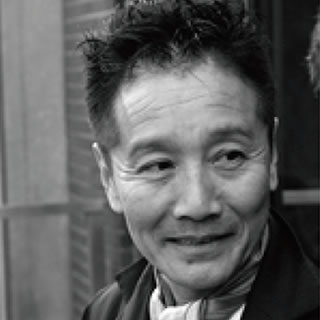
Chairman for the State of the Art Technologies in Expression Association
Profile
About Hagura Award
"The 7th State of the Art Technologies in Expression Association & Latest Technology Art Session" opened up with the opening speech by Mr. Akira Hasegawa, the chairman for the State of the Art Technologies in Expression Association. He also introduced the association's activities such as Digital Kakejiku Project "DKFORUM8" sponsored by FORUM8. Next, the Award Ceremony of The 5th Hagura Award was held. Among many entries, the awards were given to 8 works through the judgment in October: 1 Hagura Award, 1 Company Award (FORUM8 National Resilience Award), 2 Excellence Award and 4 Encouraging Award.
Many of the submitted works treated images, and following the previous year, some projects were related to sound. Moreover, a unique system using the sense of taste was introduced this year, demonstrating the expanding possibilities of expressive technology.
The Company Award was given to "Before/After VR" by Science & Technology Research Laboratries. This technology allows users to switch between two 360-degree images taken at different times in the same location, using two types of applications, one for VR goggles and the other for tablets. By comparing images of the immediate aftermath of a disaster with images of the recovery process, users can actively experience the horror of disaster and the state of recovery with a realistic sense as if they were there. This is the reason that "FORUM8 National Resilience Award" was given to this work.
Hagura Award went to "Sound Scope Phone" by Music Information Intelligence Team, RIKEN Center for Advanced Intelligence Project. When the application installed on a smartphone is launched and played, 10 types of instrumental sounds appear on the acoustic space that can be heard through headphones, surrounding the user in 360 degrees. By integrating AI processing of camera images and information from the device's acceleration and gyro sensors, 3D spatial sound is composed and presented in accordance with the direction of the head in real space, creating a musical experience as if the listner was surrounded by the music performers.
Also, the members of Hirata Takegawa Lab. from Future University Hakodate, who received the Excellence Award with "Digital Mask" that displays the wearer's facial expressions as an avatar in real time, went up to the stage with the actual mask on their face and set the mood for the Awards Ceremony.

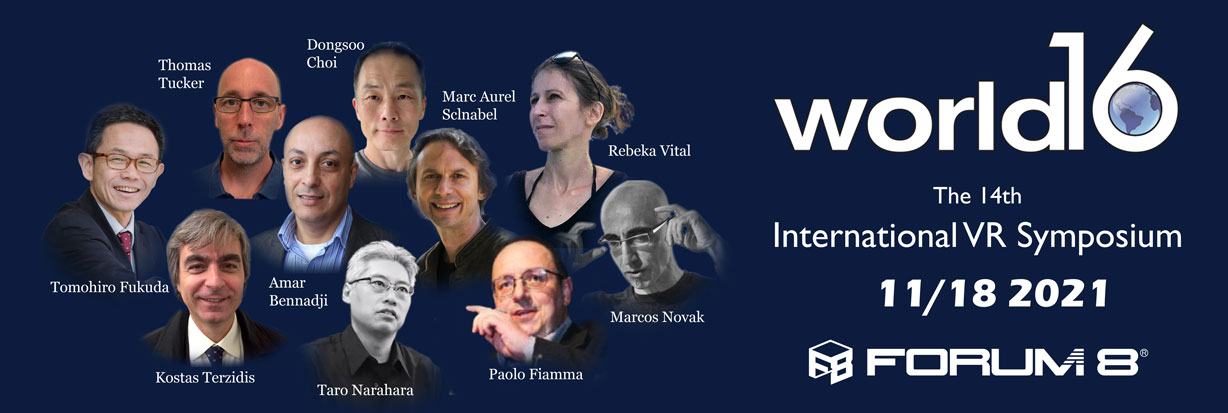
First of all, Dr. Yoshihiro Kobayashi of Arizona State University/ FORUM8 AZ Representative, representative of "World16", who is acting as an online facilitator outlined the overview of the World 16 project and its mission, which was started with participation of university researchers who make full use of VR in such fields as architecture, civil engineering, and urban planning around the world. As part of this effort, he reflected on how they had accumulated skills through the annual summer workshops and the International VR Symposium, and introduced that this workshop was held online due to the new Coronavirus crisis just as the previous year, and that this workshop had led to the presentation of 10 projects among others at this symposium.
Next, World16 members also presented their research results of the projects they worked on online.

Introduction / Host
Arizona State Univ.
He creates the same objects as in the VR space by using 3D printing, which can be operated seamlessly with the real space, such as editing the attributes of the model in VR as well as generating scent and surface texture in real time. As an example, he introduced a project to model the growth process based on dinosaur bones.
He made a presentation “Volumetric & Surface Calculation Using Point Cloud in UC-win/Road”, proposing development of a tool to collect and analyze point cloud data and measure distance, area, volume, etc. for an archaeological survey project. Using video, he explained the specific procedure of reproducing the archaeological building and linking it with UC-win/Road's 4D simulation function.
This is a tool to collect learning data for AI study that can be linked with F8VPS. Multiple users can register "Like" for cities and buildings together with their location data, and the heat map with the accumulated data is displayed on the map. Subjective evaluations (the amount of “Likes” attached to buildings) are quantified/digitized.
Using VR-NEXT for multimedia art study, he proposed the development of a media server that can link multiple PCs, projectors, and sound systems etc. in real time. He also mentioned how to represent visible and hidden parts using AI and machine learning.
He proposed an interface that can realize complex designs with only eye movements, such as using eye tracking to create and edit objects in VR space. His topics included heatmaps that show how much people see which parts of which buildings in the city center.
He proposed to share space in real time using point cloud data. He developed a function to sketch and create objects directly in VR space in collaboration with F8VPS. He also mentioned a study on developing online activities such as remote classes.
He proposed manufacturing education for elementary school pupil through programming instruction and AI technology. Using simple script languages, it is possible to create maze mini-game randomly in UC-win/Road. He explained from a viewpoint that this can be an attractive educational tool for children.
Prof. Paolo Fiamma (University of Pisa) made a presentation entitled "To model deep”, focusing on using BIM in construction engineering. His system is to manage underground facilities such as pipes through visualizing them by easily creating, updating, and utilizing VR data in addition to drawing and databases. He illustrated part of “Modeling Smart Cities" where multiple pipelines connect with each other at the underground intersection.
Utilizing the 4D simulation function of UC-win/Road, the construction process for energy-saving housing is visualized. Working on developing learning tools that can be used in university education, he introduced a simulation example for visualizing heat loss in an existing house and renovating it.
She suggests an IES file import function for lighting simulation. It can be used for planning proposals by interactively verifying changes in nighttime lighting according to types of outdoors lights. She also mentioned improvement by finding out the problem of shading on the road.
Executive officer and Development Senior Manager of FORUM8
Lecture
In response to the presentations made by World 16 members, Pencreach Yoann, Executive officer and Development Senior Manager of FORUM8 expressed his gratitude to the members for their various proposals of utilizing VR and pointed out the importance of sharing these pieces of knowledge in leading to future product development. In addition, while mentioning the direction of development of inhouse technologies such as VR-NEXT, he said that they would like to continue to strengthen cooperation with the members through providing concepts and platforms useful for the efforts of World 16.

At the end of the day 2 afternoon was held the awards ceremony for the 7th Junior Software Seminar. VR works created through "Junior Software Seminar" held for elementary and junior high school students were introduced and honored. "Junior Software Seminar" had been held both at the venue and online by connecting the Tokyo head office and nine seminar rooms nationwide by video conference during vacations of winter, spring, and summer, and also incorporating online seminars. This time, the winners took part in the ceremony at the venue or online, receiving 6 Gold Prizes, 5 Silver Prizes and 3 Bronze Prizes. Their bold and unique ideas were enlivened by Packun (Patrick Harlan)'s skillful way of speaking, creating a relaxing moment.
(The reports other than Hagura Award Report are written by Takashi Ikeno)